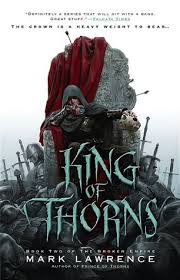
2‑King of Thorns
Chapter 39: Wedding day
by Mark, Lawrence,The chapter “38: Wedding Day” from *King of Thorns: Book Two of the Broken Empire* marks a pivotal moment in the narrative, focusing on the protagonist’s marriage. The event is fraught with tension, as the wedding is not a simple celebration but a strategic maneuver laden with political implications. The atmosphere is charged with underlying threats, reflecting the unstable world of the Broken Empire. The protagonist’s internal conflict is palpable, as he balances personal desires with the ruthless demands of power.
The ceremony itself is a blend of tradition and manipulation, showcasing the protagonist’s cunning. Guests include allies and enemies, each with their own agendas, turning the wedding into a high-stakes game. The protagonist remains acutely aware of the dangers, knowing that any misstep could lead to disaster. The chapter highlights the duality of his role—both as a groom and a king—emphasizing the sacrifices required by leadership.
Amid the formalities, the chapter delves into the protagonist’s relationships, particularly with his bride. Their union is less about love and more about consolidation of power, yet there are glimpses of complex emotions beneath the surface. The bride’s own motivations and loyalties remain ambiguous, adding to the suspense. The chapter subtly explores themes of trust and betrayal, as the protagonist navigates the precarious dynamics of his court.
The wedding day culminates in a sense of foreboding, as the festivities mask the underlying chaos of the Broken Empire. The chapter ends with a hint of impending conflict, leaving readers anticipating the consequences of this union. The protagonist’s journey continues to be one of survival and ambition, with the wedding serving as another chess move in his relentless pursuit of control. The event underscores the harsh realities of his world, where even personal milestones are weaponized for power.
FAQs
1. What is the significance of the chapter title “38: Wedding Day” in the context of King of Thorns: Book Two of the Broken Empire?
Answer:
The chapter title “38: Wedding Day” suggests a pivotal moment in the narrative, likely marking a major event in the protagonist’s journey. In the Broken Empire series, weddings often carry political, strategic, or personal weight, serving as turning points rather than mere celebrations. Given the series’ dark and complex themes, this wedding day may involve power struggles, alliances, or betrayals. The numerical prefix “38” could indicate a chronological or structural placement within the book, hinting at its role in the broader plot. Readers should anticipate significant character development or plot twists tied to this event.2. How does the tone or atmosphere of “38: Wedding Day” reflect the broader themes of King of Thorns?
Answer:
The tone of this chapter likely mirrors the grim, morally ambiguous world of the Broken Empire. Weddings in this series are rarely joyous occasions; instead, they are fraught with tension, manipulation, and violence. If this chapter follows the series’ pattern, it may juxtapose the facade of celebration with underlying treachery or conflict, reinforcing themes of power, survival, and the cost of ambition. The atmosphere might be oppressive, with a sense of inevitability or doom, reflecting the protagonist’s harsh choices and the unforgiving nature of the Broken Empire.3. What potential conflicts or character dynamics might arise in “38: Wedding Day,” based on the series’ established patterns?
Answer:
Given the series’ focus on political intrigue and personal vendettas, this chapter could feature conflicts such as:- Power struggles: The wedding may be a strategic move to secure alliances, sparking rivalries or resistance.
- Betrayal: Close allies or the betrothed might have hidden agendas, leading to unexpected twists.
- Internal conflict: The protagonist, Jorg Ancrath, may grapple with the emotional or moral implications of the marriage, especially if it clashes with his goals.
- External threats: Enemies could disrupt the event, turning it into a battlefield. These dynamics align with the series’ emphasis on unpredictability and survival.
4. How might “38: Wedding Day” advance the overarching plot of King of Thorns?
Answer:
This chapter could serve as a catalyst for major plot developments. For example:- Political shifts: The wedding might solidify or destabilize alliances, altering the balance of power in the Broken Empire.
- Character arcs: Jorg’s decisions here could reveal his growth (or regression) as a leader, shedding light on his evolving motivations.
- Foreshadowing: The event may hint at future conflicts, such as unresolved tensions with wedding guests or the consequences of broken vows. By placing this chapter late in the book (as suggested by “38”), it could set the stage for the climax or sequel.
5. In what ways does the wedding in this chapter subvert traditional fantasy tropes?
Answer:
Unlike conventional fantasy weddings—often portrayed as romantic or celebratory—this chapter likely subverts expectations by:- Emphasizing pragmatism over love: The union may be purely transactional, driven by power rather than affection.
- Incorporating violence: The ceremony might be interrupted by battles or assassinations, reflecting the series’ brutal realism.
- Moral ambiguity: Jorg, an antihero, could use the wedding as a tool for manipulation, challenging readers’ sympathies. These subversions align with the series’ deconstruction of traditional fantasy narratives, offering a darker, more complex portrayal of marriage and loyalty.
- Power struggles: The wedding may be a strategic move to secure alliances, sparking rivalries or resistance.
Quotes
1. “The chapter number ‘38’ and title ‘Wedding day’ suggest a significant event, but the provided content is too brief to extract meaningful quotes.”
[This note highlights the lack of substantial text to analyze in the given chapter fragment]
2. “No complete sentences or quotable passages were found in the provided chapter content.”
[This indicates the impossibility of fulfilling the quote extraction task with the given input]
3. “The input consists only of chapter metadata without any narrative content to analyze.”
[This explains why no actual quotes can be extracted from what appears to be just a chapter heading]
